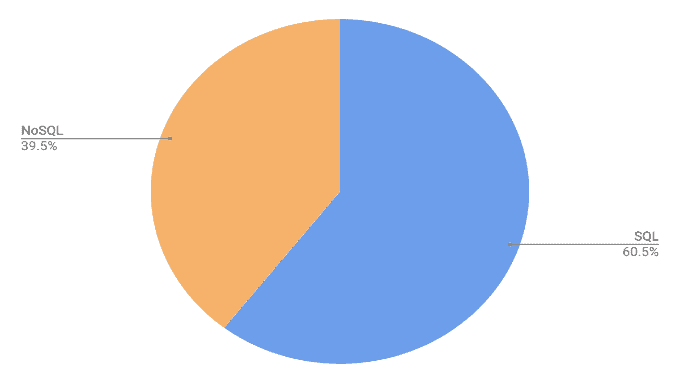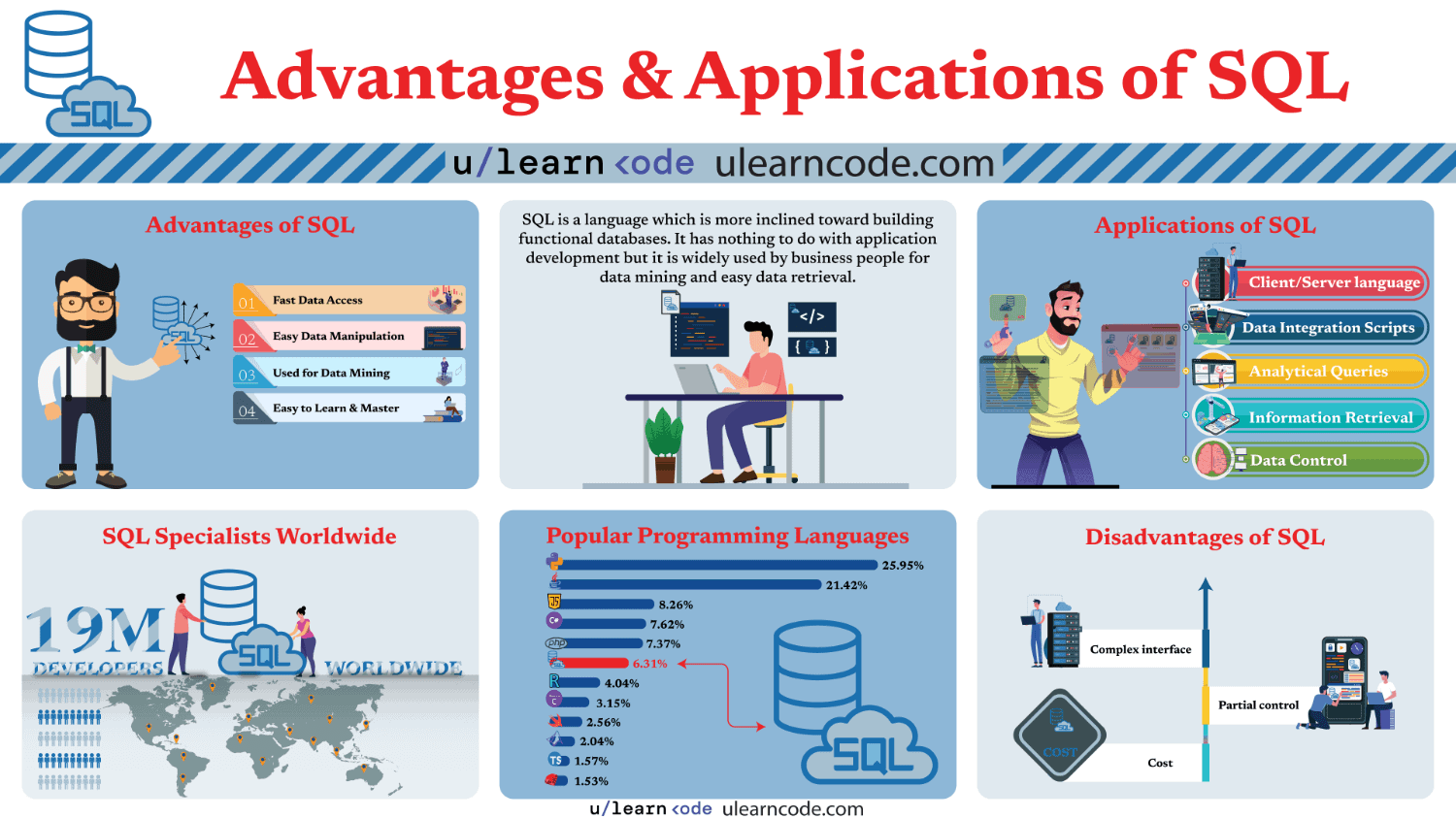Contents
All websites use some sort of database to store their user’s data. This data is accessible, manageable and alterable with the help of the SQL language. SQL stands for Structured Query Language which deals with databases and their functions.
The SQL operates with relational databases to store, manipulate or retrieve data. The language is extremely easy to learn and it can provide people in business and marketing with an additional skill set. Moreover, SQL independently works with most of the modern databases.
SQL and NoSQL are two sides of the same coin, where one deals with relational databases while the other focuses on unstructured data. The pie chart below depicts usage of both languages.

Programmers also prefer to use SQL language in database management systems where constant access to data is needed. As SQL is a database-focused language, its applications also basically revolve around this domain.
Where Is SQL Used?
SQL is mainly used for database management and here are few of its relevant implementations that also deal with databases.
1. Client/Server Language
The SQL forms a bridge between the client and server side of a particular application or website where a transfer of information needs to be initiated.
For example, a user might sign up for an account on the front-end of a website but all credentials are being stored on the server-side database which is managed by SQL.
Hence, SQL supports the client/server architecture to make the retrieval, addition, modification or disposal of information easy. Some other server-side languages such as PHP and Python handle the overall back-end functionality of an application while SQL specifically deals with databases.
2. Data Integration Scripts
Integration scripts are used to handle the moving of data between applications and SQL is the language which is the most widely used to write these integration scripts that makes data integration possible.
Data administrators and developers mostly use the SQL language to write such scripts, which facilitates the data integration processes.
3. Data Definition
Using SQL, a database can be created along with its desired structure to facilitate the transfer, retrieval or removal of data. The language facilitates the creation of databases instantly and developers can use them as long as they want.
These databases can easily be disposed of once they have served their purposes. All objects in the databases such as indices, users and tables can be modified, deleted or retrieved.
4. Analytical Queries
SQL also deals with analytical queries where multiple queries are collected from different databases to form a single result.
In SQL, the analytical functions are used to calculate different values based on multiple rows to return a single result for each set of rows.
5. Information Retrieval
The SQL statements are widely used to retrieve the desired information from databases. This information might be stored in different blocks, where each block is given a name where a certain type of data is stored.
This retrieved information is mostly used for transaction processing or analytical stuff. Here are few of the elements that are commonly used for information retrieval and modification:
- elect
- insert
- update
- add
- delete
- create
- truncate
- alter
6. Data Control
The access control to a database needs to be limited so that an unauthorized person cannot easily steal and misuse the data. Data control ensures that only authorized users have access to a specific block of data.
SQL gives limited privileges to the use of data, but attackers can potentially use loopholes or SQL injection techniques to bypass such authorization privileges to steal confidential data or credentials of users.
Why Learn SQL

Major organizations such as Oracle, IBM and Microsoft use SQL for their relational database systems which already tells us a lot, but even without counting the fact SQL has many reasons to be learned:
1. Fast Data Access
SQL allows users to retrieve their data fast from relational databases. It has the ability to manage large amounts of organized data where instant access is provided to authorized users. This allows companies to operate fast and users can also store their information quickly due to an organized architecture.
2. Easy Data Manipulation
The data stored in SQL databases can easily be accessed and manipulated. Authorized users can effectively change any desired block of data using some simple statements. This also makes data more vulnerable to attackers if proper data control is not implemented.
3. Used for Data Mining
If you want to retrieve a specific data at a given time interval and also want to view update events along with table activity, then SQL is the language that can dig deep into relational databases to quickly provide desired results.
Data mining is the major reason that so many people are inclined to learn SQL and you can learn it, too, by choosing from the best SQL courses that will provide you thorough guidance.
4. Easy to Learn & Master
The English-based syntax of the SQL language makes it an easy option for programmers to learn. The language has a fairly simple syntax with memorable words that are used as statements. You can learn basic SQL concepts in about two to three weeks.
Moreover, you can master this language in a few months to start working with relational databases for the purpose of data mining, retrieval or even modification.
To Sum Up
We can conclude that SQL is a language which is more inclined toward building functional databases. It has nothing to do with application development but it is widely used by business people for data mining and easy data retrieval.
Still, SQL is a powerful language that has created numerous job opportunities for database experts. If you want to work on the server-side of the applications to handle database-relevant stuff, then SQL is the go-to option.
Otherwise, you can explore other languages if you want to pursue your career as a website, game or application developer.